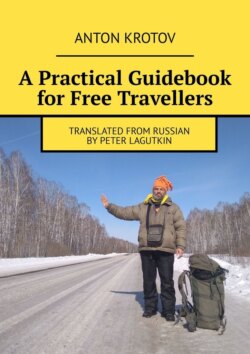Читать книгу A Practical Guidebook for Free Travellers. Translated from Russian by Peter Lagutkin - Антон Кротов - Страница 8
Hitch-Hiking
The Teaching Of Hitch-Hiking
ОглавлениеThere’s more than one school of hitch-hiking thought in Russia; the oldest one styles itself (in clumsy English) Petersburg AutoStop League (or PASL; a better translation would be St. Petersburg League of Hitch-Hiking, and the Russian acronym is PLAS, pronounced PLAHS). It was founded in 1978 by Aleksey Vorov who has hitch-hiked more than 1,850,000km, or 1,150,000mi, setting an unsurpassed record.
Aleksey Vorov has spent many years training people in competitive hitch-hiking, which means more than getting lifts – it means trying to get the fastest lifts possible and outrace your rivals. To achieve this, PASL members stage lectures and even hitch-hiking races; they design, make, and use special equipment. A qualified PASL member can advance around 1,100 to 1,400km in 24 hours (in summer time, sticking to Russia’s major roads) in the day or in the night if he or she wishes so. You can easily recognise PASL members on the road by their characteristic, striking yellow overalls.
The author of this book has had the privilege to learn a lot while talking to Aleksey Vorov and some of his followers.
PASL hitchhikres
PASL’s biggest achievement was their 1992—1993 round-the-world hitch-hiking expedition they called AutoColumb («Car Columbus»). Its participants hitch-hiked around the world and never used any regular public transportation. They crossed 25 countries of Eurasia, North and South America, and that at the time when we ourselves didn’t even dream of such adventures. PASL is a somewhat secretive organisation; they are very poorly represented on the internet.
The second hitch-hiking school in Russia is actually called Moscow School of Hitch-Hiking (also known by its Russian acronym MShA, pronounced m-shah). It was founded in 1994 by Moscow hitch-hiker Valery Shanin. In the same year he published his book, entitled Hitch-Hiking: Free Lifts in the US and Europe (the original titular word is actually transcribed from English word and sounds pretty alien to many Russians; the more common word avtostop is included in the subtitle for explanation), still in print (as of 2014).
In the 1990s, Valery and his followers travelled all around Europe (sometimes with visas, sometimes without). The following decade saw Valery and the others switch focus to other continents. He travelled around the world several times (not by «pure» hitch-hiking) and authored some twenty guide-books and another fun-to-read book, Around the World for $280. More light used to be shed on Shanin’s deeds on his club’s web-page, but it is now defunct.
Of course, there were many lonewolf hitch-hikers in Russia, collectively possessing vast, yet unsystematised (hence, unusable) pool of experience; probably the earliest group of people to practice hitch-hiking regularly were the hippies. In recent years, more and more stories from such people surface on the internet. This book originated as an attempt to summarise the experience of a great number of hitch-hikers.
In 1995, yet another hitch-hiking school appeared in Moscow, called Academy of Free Travellers (the Russian acronym is AVP, pronounced ah-veh-peh) and founded by the author of this book. Our two purposes were, and still are: to make what we do a more popular practice and to gather and spread valuable information. Some of us write books. One of those is in your hands now.
We have organised 25 major expeditions and many more smaller trips and hikes. AVP sages (those who’ve made exceptional contributions to the common cause with their experience and wisdom) have visited every administrative division of Russia and all ex-Soviet states – and a good hundred other countries. We were the first Russians to hitch-hike to Iran, Pakistan, and India. We have hitch-hiked across Africa – from Egypt and Sudan to Namibia and Angola. And we still have time for our unique project, «House for Everyone,» which means that, somewhere in the world, we temporarily rent a house (or flat) and offer any sober and discreet traveller free shelter, food, and company. We have opened (and closed already) such Houses in Irkutsk (Siberia; 2006), Osh (Kyrgyzstan; 2007), Cairo (Egypt; 2008), Vladivostok (Russia’s Far East; 2009), Arkhangelsk (Russia’s North; 2009—2010), Dushanbe (Tajikistan; 2010), Istanbul (Turkey; 2012; we did it instead of Damascus because of the war), Krasnoyarsk (Siberia; 2012), Kunming (China; 2012—2013), Mexico City (2012—2013), and Antananarivo (Madagascar; 2013—2014), and as this translation is being prepared, we ourselves are preparing to open three more consecutive houses in Sevastopol (the Crimea; we had to cancel the house in Lvov due to travelling restrictions in Ukraine), Berlin (Germany), and Yogyakarta (Indonesia). Every June, we hold weekend-long Sober Outdoor Gatherings (in a forested area outside Moscow, and yes, alcohol and drugs are strictly prohibited) where some of the most interesting travelling stories are told in the form of lectures. We have organised about one hundred hikes (always off the beaten tourists’ track, sometimes quite taxing physically). And we do a lot more stuff.
For more about our adventures, read the many books by Anton Krotov (yes – all in Russian… with translations NOT expected soon) or simply google his name. Our lectures, gatherings, meetings, and hikes are open for everyone.
There are other hitch-hiking clubs across ex-USSR, but most of them show no signs of productive activity.
